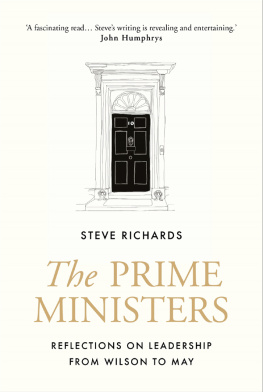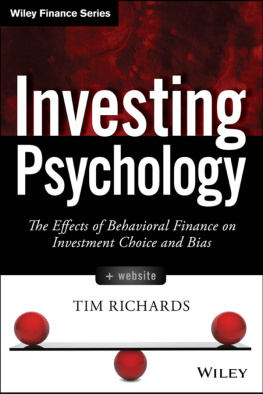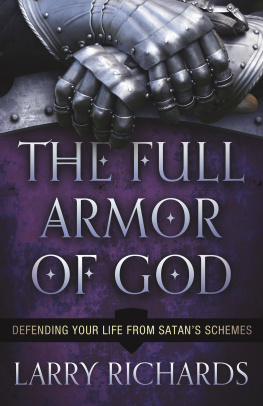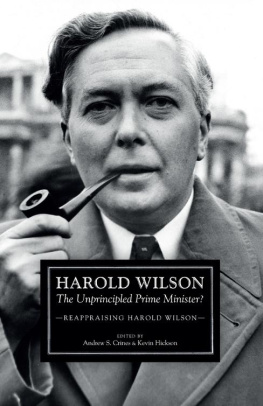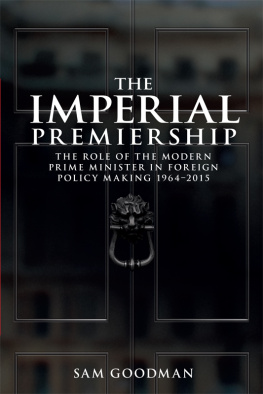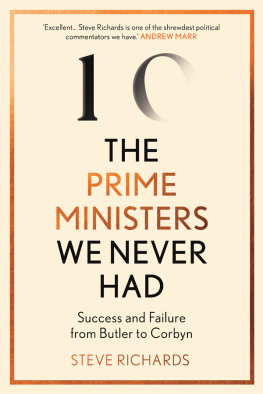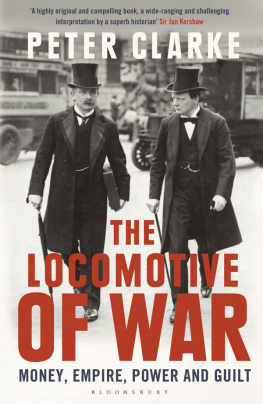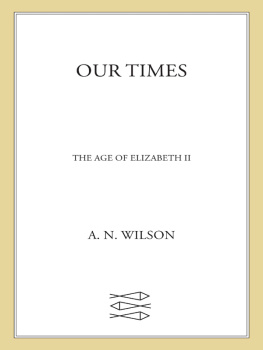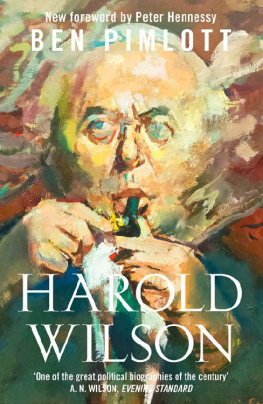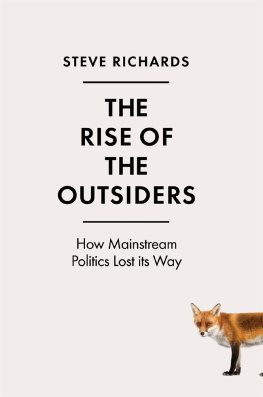Contents
Guide
The PRIME
MINISTERS
REFLECTIONS ON LEADERSHIP
FROM WILSON TO MAY
There has been no better time to absorb oneself in some modern political history, and there is no better person to guide you through it than Steve Richards. The great thing about Steves book is that it helps us understand how our last nine prime ministers viewed things themselves and why they took the decisions they did.
Evan Davis
A pure pleasure to read. In Richards bright, sharp portraits of nine prime ministers, all our modern history springs to life. An enlightening retrospective.
Polly Toynbee
Steve Richards ability to get inside the heads of our modern prime ministers is extraordinary some of them might even look at themselves with a new acuity.
Kirsty Wark
Steve Richards excellent portraits of prime ministers are both penetrating and sympathetic. Written from his expert perspective as a broadcaster and political journalist, this book is deeply insightful about the people who have tried to govern us.
Adam Boulton
Steve Richards offers a real treat to readers. Covering no fewer than nine prime ministers, he displays his talents to the full: an unsurpassed grasp of the context of leadership, empathetic yet properly critical assessment of records, and a communication style that can reach out to anyone interested in politics and power.
John Bercow
About the Author
Steve Richards is a political columnist, journalist, and presenter. He regularly presents The Week in Westminster on BBC Radio 4 and has presented BBC radio series on Tony Blair, Gordon Brown, David Cameron and Theresa May. He also presented the BBC TV programmes Leadership Reflections: The Modern Prime Ministers, Turning Points and Reflections: The Prime Ministers We Never Had. He has written for several national newspapers including the Guardian, the Independent and the Financial Times. He also presents a popular political one man show each year at the Edinburgh Festival and across the UK.
First published in hardback in Great Britain in 2019 by Atlantic Books, an imprint of Atlantic Books Ltd.
Copyright Steve Richards, 2019
The moral right of Steve Richards to be identified as the author of this work has been asserted by him in accordance with the Copyright, Designs and Patents Act of 1988.
All rights reserved. No part of this publication may be reproduced, stored in a retrieval system, or transmitted in any form or by any means, electronic, mechanical, photocopying, recording, or otherwise, without the prior permission of both the copyright owner and the above publisher of this book.
The picture acknowledgements on constitute an extension of this copyright page.
Every effort has been made to trace or contact all copyright holders. The publishers will be pleased to make good any omissions or rectify any mistakes brought to their attention at the earliest opportunity.
10 9 8 7 6 5 4 3 2 1
A CIP catalogue record for this book is available from the British Library.
Hardback ISBN: 978 1 78649 587 7
E-book ISBN: 978 1 78649 589 1
Printed in Great Britain
Atlantic Books
An imprint of Atlantic Books Ltd
Ormond House
2627 Boswell Street
London
WC1N 3JZ
www.atlantic-books.co.uk
To Lachlan, who was born as one prime minister fell and as another hopeful figure prepared to acquire the thorny crown.
CONTENTS
INTRODUCTION
There are memoirs by prime ministers. There are biographies of prime ministers. This is the first book to reflect at some length on all the modern prime ministers, from Harold Wilson, who ruled first in 1964, to Theresa May, who entered Number Ten in the aftermath of the seismic 2016 referendum.
Some modern prime ministers are viewed more vividly than others. Margaret Thatcher and Tony Blair are still recalled with a multicoloured intensity. The explosive consequences of Theresa Mays and David Camerons leaderships will still be taking shape for another decade at least. Other prime ministers are ghostly, distant figures, even though there are many lessons from their leaderships that are urgently relevant.
This book is an attempt to make sense of their leaderships, to take a step back and look at the political stage as it seemed to them. The reflections aim to bring to life the complex three-dimensional human beings who made it to the very top a triumphant ascent that became, for some, a nightmare when the peak was reached. Shakespeare is cited as much as other, more recent political observers. The lessons learned will also hopefully appeal to those in any field who are interested in the qualities required of leaders.
My definition of modern prime ministers is based on two factors. The leaders from Harold Wilson to Theresa May were part of the television era, when a more direct and potentially hazardous form of communication with the electorate took hold. The later ones were also navigating the social-media revolution, one in which politics speeded up. Wilson became neurotically angry about newspapers and the BBC, as did all his successors at various points. Even so, if he was worried about a poor performance at Prime Ministers Question Time he would have nearly twenty-four hours to await the verdict of the next days newspapers. Today, advisers to prime ministers alert them to the verdict on Twitter immediately after the event, while twenty-four-hour rolling television news is a constant, never-ending commentary. Wilsons immediate predecessors, Alec Douglas-Home and Harold Macmillan, faced no such pressures. Macmillan read Jane Austen in the afternoons quite often. Now even he, a lover of literature, would be distracted by Sky News and Twitter.
The other defining factor is that these are the prime ministers I knew directly or observed closely. What was written about them at the time, and to some extent since, did not seem to me anywhere near the full story. I never met Wilson, but I observed him at first hand. The other prime ministers I knew, with varying degrees of access. The purpose of the book is not to attack them from the left or the right. That has been done a thousand times before. I do not accept the political fashion that the divide between left and right has become irrelevant. On the role of the state, raging questions about how to deliver decent public services and how governments can mediate in a global economy, the left-versus-right divide is as relevant as ever. But to write relentlessly about recent prime ministers from one perspective would not be especially illuminating. Instead, based on a career in political journalism that has so far included many conversations and interviews with prime ministers, aspirant prime ministers and their numerous critics, this book aims to challenge prime ministerial caricatures. In doing so, I seek to reflect on the qualifications of leadership and on how perhaps no one is, or can be, fully equipped for the mighty tasks involved. Looking at each of the prime ministers again, I am constantly surprised by what I see by their unexpected strengths and weaknesses.
I turn to them now, at a time of epic national crisis, partly because the Brexit drama in the UK was brought about, and then deepened, by failures in leadership. Conversely, the dangerous anti-politics mood both a cause and a consequence of Brexit is deepened by misreadings of leaders and politicians more generally. Some voters felt left behind with good cause and ached to seize back control as work patterns became fractured and public services were fragmented in the name of empowerment, only to disempower. But the leaders who were culpable for hopelessly misjudged policies did not act out of wilful malevolence or for reasons of corrupt venality. Their motives were more interesting than that. There is no evidence to suggest that modern prime ministers were criminal, corrupt or lacked integrity, as is widely assumed. Their flaws were epic, but had little to do with their perceived sleaziness. Yet most prime ministers left office tormented by perceptions of their rotten lack of integrity.

